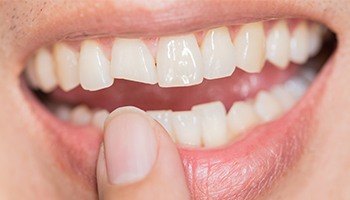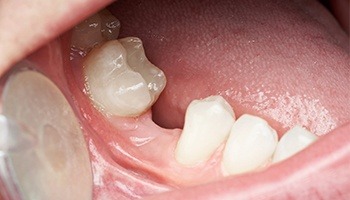Emergency Dentistry – Charlottesville, VA
Don’t Wait, Get Your Emergency Handled Today!
When a dental emergency occurs, you may not be aware of whether you should go to the emergency room or to a dentist. Dr. Lippard understands how important it is to treat a dental emergency right after it happens, whether it’s caused by long-term decay from unremoved plaque or from a physical injury while eating or playing contact sports. If you’re experiencing a dental emergency, don’t wait; call our office today, stop discomfort and save your tooth!
Why Choose Hal M. Lippard, DDS for Emergency Dentistry?
- CAD/CAM Technology for Same-Day Restorations
- Sedation Dentistry Available
- Calming and Accommodating Dentist and Team
How to Handle Common Dental Emergencies

Regardless of the dental emergency you’re having, call our office as soon as you can so you can schedule an appointment the same day it happens. After all, the sooner you call, the more likely you can get seen. Before you arrive, you’ll want to consider the most effective steps to take next to manage your situation. When you call, one of our team members would be happy to provide advice over the phone.

Toothaches
Use dental floss to remove potential food debris from in between your teeth, then wash your mouth out with warm water. If discomfort persists, take an over-the-counter painkiller and apply a cold compress to your tooth to reduce any swelling. We will perform a detailed exam to confirm the cause of your toothache and go from there.

Chipped/Broken Teeth
Keep any pieces of the tooth that you can. Take a painkiller to alleviate discomfort and put dental cement to cover your tooth if it appears jagged or sharp. This ensures that you don’t accidentally cut your tongue or oral tissue before you arrive. We will likely need to cover the tooth using a dental crown.

Knocked-Out Tooth
Do your best to locate the tooth and bring it to our office. After picking it up by the crown portion only (never the root), gently rinse it of any dirt or debris, making sure to leave any tissue still attached. After rinsing your mouth out with warm water, place the tooth back into your open socket. If not possible, keep it contained in milk and get to our office right away so we can re-implant it.

Lost Filling / Crown
If you still have the restoration, use either dental cement, denture adhesive, or sugar-free chewing gum to temporarily reseat it. If this does not keep the restoration secure or you’ve lost it, avoid chewing on that side of your mouth until you can get it replaced at our office.
How to Prevent Dental Emergencies

The good news is most dental emergencies can be avoided when you have the right preventive steps. For example, make sure to brush twice a day with fluoridated toothpaste, floss at least once a day, and visit our office every six months for a routine checkup and cleaning. You should also be wearing an athletic mouthguard if you play contact sports or a nightguard if you suffer from teeth grinding and clenching while you sleep. Avoid chewing on inedible objects (i.e. pens, pencils, fingernails) and never use your teeth as a tool.
The Cost of Treating Dental Emergencies

Every dental emergency is unique, which means that your dental emergency may not cost as much as you might think it does. While an oral infection may only require antibiotics to treat, it could also require root canal therapy if your condition is more complex. Regardless of the situation, you should never skip treatment because of cost alone. Doing so will only allow your condition to worsen, which then leads to higher dental costs anyway. We’ll do everything we can to make your care affordable and work with you to create a treatment plan that’s within your means and gets you out of pain.
Emergency Dentistry FAQs

Dental emergencies can feel less scary when you know how to take action. That is why our knowledgeable staff has collected some of the most common questions about emergency dentistry in Charlottesville and answered them below. Take a moment to familiarize yourself with the following list of dental emergency FAQs. If you have any additional questions, don’t hesitate to contact our office!
Can Superglue Be Used to Repair Broken Dentures?
Superglue can certainly bind all sorts of materials back together. However, you should not use it to repair your dentures. The chemicals used in superglue can be toxic and can trigger allergic reactions in some patients. Even if the superglue in your house is non-toxic, it can still affect the way food tastes – and not in a good way! Finally, superglue usually does not do well in damp environments, so it may not hold your dentures together for very long after it’s applied.
Should Knocked-Out Teeth Be Placed in Water?
Rinsing a knocked-out tooth with water is recommended to clean off any dirt and debris. However, you should not actually place your tooth in water, as it can damage the tooth‘s root surface cells. If the roots are damaged, the chances of successfully placing your tooth back in its socket fall significantly. If you cannot temporarily hold your dislodged tooth in its socket as you make your way to our office, place it in a secure container with milk or saline solution instead.
Can the Emergency Room Remove a Tooth?
No, only a licensed dentist can perform tooth extractions. In fact, removing teeth is illegal for anyone – including hospital staff – who do not have the required training and education. If you visit the emergency room because of a damaged or infected tooth, your doctor or nurse will likely be able to provide you with antibiotics or pain medication. However, they will not be able to address the underlying problem causing your toothache. For that, you will need to visit a dentist. At our office, Dr. Lippard will carefully examine your tooth to determine if an extraction is even necessary. Depending on your circumstance, root canal therapy may be able to eliminate your discomfort and prevent the need for an extraction altogether.
Do Chipped Teeth Heal?
Tooth enamel is the hardest substance in the human body, according to the ADA. However, when enamel is chipped, it does not have the ability to heal on its own. At best, teeth can remineralize, but this is not considered to be the tooth “growing back.” Because even the smallest chips cannot heal automatically, you should always wear a protective mouthguard when playing contact sports. If you do accidentally chip your teeth, however, you don’t have to live with those chips forever. We offer cosmetic and other dental procedures that can restore chipped teeth back to their original shape and condition.
What Should I Keep in My Emergency Dentistry Kit?
Expect the unexpected and be prepared by packing an emergency dentistry first aid kit. You can keep this small kit in the car, at the office, or even in your purse or backpack when you’re on the go. Every good emergency dentistry kit should include:
- Small storage container for teeth or restorations
- Gauze pads and dressings
- Cotton balls
- Denture adhesive
- Anti-inflammatories such as ibuprofen
- Floss
- Ice pack
- Our contact information